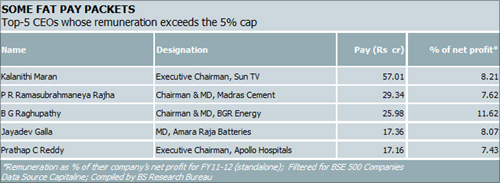 This would make India Inc happy, though the directors might not share the happiness. Indian firms pay far less to their directors than the cap in the Companies Bill.
This would make India Inc happy, though the directors might not share the happiness. Indian firms pay far less to their directors than the cap in the Companies Bill.
The Bill has made it mandatory that a director's remuneration should not exceed five per cent of the company's net profit. Higher salary can be paid only after the companies concerned take special permission.
But a Business Standard Research Bureau analysis shows the average salary of the 100 best-paid directors is only one per cent of their respective companies' net profit. The average would have been far lower, but for 27 directors whose pay packet exceeds the five per cent cap.
These 27 directors may have reasons to complain but others are generally happy with the Bill provision. "This is the right step. I am in agreement," says Bajaj Auto Chairman Rahul Bajaj.
Naveen Jindal, chairman and managing director JSPL, was the highest-paid executive in India and took home a salary of Rs 74 crore last financial year but that figure was just 3.48 per cent of his company's net profit.
Mukesh Ambani, chairman and managing director of Reliance Industries Ltd (RIL), India's largest company, was paid Rs 15 crore, 0.07 per cent of RIL's profit.
The salaries of many corporate leaders like Aditya Birla Group Chairman Kumar Mangalam Birla and Wipro Chairman Azim Premji are far below the ceiling. They, in fact, either took a salary cut or did not take any raise from the company last year.
The Companies Bill has maintained a director's remuneration should be below five per cent of his company's net profit; and when there are more than one whole-time directors, they can all together get a remuneration not exceeding 10 per cent.
It adds, if a firm has to re-state its financial statement due to a fraud or non-compliance, it can recover the amount paid in excess of five per cent of the original net profit from its director during that period.
"Promoter directors also earn from the dividend announced by companies. So, the salary and the commission on profit are not the only source of income for them. They can easily afford to take a cut," said a consultant at one of the four big firms. "But the good news is there's a big scope for salary hike for those directors who are paid less than five per cent of net profit," he said. "It's interesting that no one is talking about a ceiling on dividend income," he added.
Anandorup Ghose, head of executive compensation at Aon Hewitt, said none of the country's big companies violated the clause. "Directors' compensation at prominent firms has never exceeded five per cent. In fact, those are far below it. However, one implication of the regulation would be on disclosures. Companies have to disclose these facts in a transparent way," he added.








